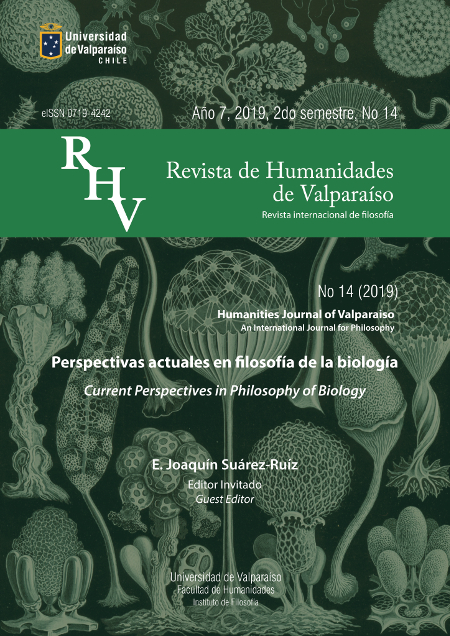Códigos de barras y esencias históricas: una crítica a la versión moderada del esencialismo biológico intrínseco
DOI:
https://doi.org/10.22370/rhv2019iss14pp75-89Palabras clave:
especies, códigos de barras de ADN, identidad trayecto-dependiente, pleiotropía ecológica/sexual, especiación ecológicaResumen
La actual tendencia a moderar las expectativas de que el código de barras de ADN pueda ser un método de descubrimiento de nuevas especies se debería a que la interpretación esencialista de esta analogía científica es conceptualmente insostenible. Algo semejante ha ocurrido en el campo filosófico con el debilitamiento de las versiones iniciales del esencialismo biológico intrínseco (EBI). Para examinar la naturaleza de esta transición propongo dos principios que definen al EBI moderado: uno que asume que la historia de un taxón es dependiente metafísicamente de la evolución de sus propiedades intrínsecas y, otro, que asume la coextensividad necesaria entre las propiedades intrínsecas que explican el fenotipo de una especie y las propiedades portadoras de las condiciones de identidad de una especie. Argumento que ambos principios son conceptual y empíricamente insatisfactorios.
Descargas
Referencias
Bolnick, D., Fitzpatrick, B. (2007). Sympatric speciation: models and empirical evidence. Annual Review of Ecology, Evolution, and Systematics, 38(1): 459-487. doi: https://doi.org/10.1146/annurev.ecolsys.38.091206.095804
Blount, Z. D., Lenski, R. E., Losos, J. B. (2018). Contingency and determinism in evolution: Replaying life’s tape. Science, 362(6415): eaam5979. doi: 10.1126/science.aam5979
Desjardins, E. (2011). Historicity and experimental evolution. Biology & Philosophy, 26(3): 339-364. doi: https://doi.org/10.1007/s10539-011-9256-4
Devitt, M. (2008). Resurrecting biological essentialism. Philosophy of Science, 75: 344-382. doi: https://doi.org/10.1086/593566
Devitt, M. (2018a). Individual essentialism in biology. Biology & Philosophy, 33(5-6): 39. doi: https://doi.org/10.1007/s10539-018-9651-1
Devitt, M. (2018b). Historical biological essentialism. Studies in History and Philosophy of Biological and Biomedical Sciences, 71:1-7. doi: https://doi.org/10.1016/j.shpsc.2018.05.004
Dumsday, T. (2017). Transhumanism, theological anthropology, and modern biological taxonomy. Zygon®, 52: 601-622. doi:10.1111/zygo.12346
Dumsday, T. (2012). A new argument for intrinsic biological essentialism. Philosophical Quarterly, 62: 486-504. doi: https://doi.org/10.1111/j.1467-9213.2012.00048.x
Ereshefsky, M. (2014). Species, historicity, and path dependency. Philosophy of Science, 81(5): 714-726. doi: 10.1086/677202
Ereshefsky, M. (2010b). What’s wrong with the new biological essentialism. Philosophy of Science, 77: 674-685. doi: 10.1086/656545
García-Carpintero, M. (1996). Superveniencia y determinación del contenido amplio. Revista de Filosofía, IX(16): 57-92.
Gavrilets, S. (2004). Fitness landscapes and the origin of species. Princeton: Princeton University Press.
Godfrey-Smith, P. (2009). Darwinian Populations and Natural Selection. Oxford: University Press.
Gould, S.J. (2004 [2002]). La estructura de la teoría de la evolución. Traducción de Ambrosio García Leal. Barcelona: Tusquets.
Hebert, P.D.N., Stoeckle, M., Zemlak, T., Francis, C. (2004). Identification of birds through DNA barcodes. PLoS Biol, 2(10): e312. doi: doi.org/10.1371/journal.pbio.0020312
Hebert, P.D.N., Hollingsworth, P.M, Hajibabaei, M. (2016). From writing to reading the encyclopedia of life. Phil. Trans. R. Soc. B, 371(1702): 20150321. doi: 10.1098/rstb.2015.0321
Holmes, B. (2004). Barcode me. NewScientist, 182: 32-35.
Jones, G., Van Parijs, S. (1993). Bimodal echolocation in pipistrelle bats: are cryptic species present? Proc. R. Soc. Lond. Ser. B, 251: 119-125. doi: https://doi.org/10.1098/rspb.1993.0017
Kekkonen, M., Hebert, P. D. (2014). DNA barcode-based delineation of putative species: efficient start for taxonomic workflows. Mol Ecol Resour, 14: 706-715. doi:10.1111/1755-0998.12233
Kim, J. (1993). Supervenience as a philosophical concept. En Supervenience and Mind, pp. 131-160. Cambridge: Cambridge University Press.
Kingston, T., Rossiter, S. (2004). Harmonic hopping in Wallacea’s bats. Nature, 429(6992): 654-657. doi: 10.1038/nature02487
Kitcher P. (2003 [1984]). Species. En P. Kitcher, Mendel’s mirror: philosophical reflections on biology, pp. 113-134. New York: Oxford University Press.
Lee, M. (2004). The molecularisation of taxonomy. Invertebrate Systematics, 18(1): 1-6. doi: doi.org/10.1071/IS03021
Lenski, R., Travisano M. (1994). Dynamics of adaptation and diversification: a 10,000-generation experiment with bacterial populations. Proc Natl Acad Sci U S A, 91(15): 6808-14. doi: 10.1073/pnas.91.15.6808
Maynard Smith, J., Szathmary, E. (1995). The major transitions in evolution. Oxford: University Press.
Mayr, E. (1968 [1966]). Especies animales y evolución. Santiago de Chile-Barcelona: Universidad de Chile y Ariel.
Nosil, P. (2012). Ecological Speciation. Oxford University Press, Oxford.
Okasha, S. (2002). Darwinian Metaphysics: Species and The Question of Essentialism. Synthese, 131: 191-213. doi: 10.1023/A:1015731831011
Paz, A., González, M., Andrew, J. (2011). Códigos de barras de la vida: introducción y perspectivas. Acta biol. Colom., 16(3): 161-176.
Rubinoff, D., Cameron, S., Will, K. (2006). Are plant DNA barcodes a search for the Holy Grail? Trends in Ecology and Evolution, 21(1): P1-2. doi: 10.1016/j.tree.2005.10.019
Servedio, M.R, Van Doorn, G. S., Kopp, M., Frame, A. M., Nosil, P. (2011). Magic traits in speciation: ‘magic’ but not rare? Trends. Ecol. Evol., 26(8): 389-397. doi: 10.1016/j.tree.2011.04.005
Sober, E. (1980). Evolution, Population Thinking, and Essentialism. Philosophy of Science, 47: 350-383. doi: https://doi.org/10.1086/288942
Soler, M. (2003). Selección natural y adaptación. En M. Soler (ed.), Evolución. La base de la biología, pp. 127-157. Granada: Proyecto Sur de Ediciones.
Tahko, T. (2015). Natural Kind Essentialism Revisited. Mind, 124(495): 475-822. doi: 10.1093/mind/fzv027
Veit, W. (2019). Evolution of multicellularity: cheating done right. Biology & Philosophy, 34(3): 34. doi: https://doi.org/10.1007/s10539-019-9688-9
Walsh, D. (2006). Evolutionary Essentialism. The British Journal for the Philosophy of Science, 57(2): 425-448. doi: https://doi.org/10.1093/bjps/axl001
Will, K.W., Mishler, B.D., Wheeler, Q.D. (2005). The perils of DNA barcoding and the need for integrative taxonomy. Syst Biol., 54(5): 844-51. doi: 10.1080/10635150500354878
Descargas
Publicado
Número
Sección
Licencia
Aquellos autores/as que tengan publicaciones con esta revista, aceptan los términos siguientes:
- Los autores/as conservarán sus derechos de autor y garantizarán a la revista el derecho de primera publicación de su obra, el cual estará simultáneamente sujeto a la Licencia de reconocimiento de Creative Commons (CC BY-NC-ND 4.0 International) que permite a terceros compartir la obra siempre que se indique su autor y su primera publicación esta revista.
- Los autores/as podrán adoptar otros acuerdos de licencia no exclusiva de distribución de la versión de la obra publicada (p. ej.: depositarla en un archivo telemático institucional o publicarla en un volumen monográfico) siempre que se indique la publicación inicial en esta revista.
- Se permite y recomienda a los autores/as difundir su obra a través de Internet (p. ej.: en archivos telemáticos institucionales o en su página web) antes y durante el proceso de envío, lo cual puede producir intercambios interesantes y aumentar las citas de la obra publicada. (Véase El efecto del acceso abierto).






